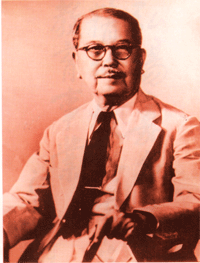 TAN KAH KEE (1874-1961)
TAN KAH KEE (1874-1961)
Tan Kah Kee rose from humble beginnings as a village boy from Fujian Province, to great prominence as an entrepreneur, social reformer, political activist, philanthropist, and community leader. He was acknowledged as a wise and generous friend of Chinese people in China, and also in Singapore and Malaya. When he died in Beijing in1961, at the age of 87, he was accorded a state funeral for his contribution to the country.
He was born on October 1874 in Fujian, China, after time of great turmoil. When he was a teenager, in 1890, Tan joined his father in Singapore, which was then under the jurisdiction of British-ruled India and part of Malaya. Many Chinese immigrants worked in the Singaporean rubber plantations and related businesses survived and failed around the plantations. When Tan’s father’s rice business failed in 1904, young Tan started a pineapple canning business. He was only 17 but Tan Kah Kee was thinking ahead, to rubber. He had a rubber plantation in mind and beyond that, rubber manufacture. Rubber was the commodity upon which he built a diversified conglomerate that made him one of the most successful overseas Chinese businessmen in Southeast Asia. By the 1920s, he presided over a huge business empire, including rubber plantation and manufacturing, shipping, import and export brokerage, real estate and rice trading, employing over 10,000 people living in most East and Southeast Asian cities. As one of the earliest industrial pioneers in the region, Tan Kah Kee earned the accolade Henry Ford of Malaya.
Philanthropy
Tan poured profits made during the World War I into political causes in China. And his business success put him in the leadership of the Hokkien community in Singapore, that is, the community of people, like himself, from Fujian province speaking the Hokkien dialect. He urged his fellows to avoid habits then prevalent, like gambling, opium-smoking and ritual extravagance but he was also concerned about the health and success of the all Chinese nationals who had left familiar places and people all across China in search of opportunity and success in Malaya and Singapore.
In 1929, he established a Chinese Association to enable different linguistic and regional culture groups to overcome parochial interests and cooperate for the betterment of all. He raised money, donated money, and directed efforts to improve lives of mainland Chinese through the turbulent twenties and thirties.
In Singapore, he helped found five primary and secondary Chinese schools. He supported English-medium schools, for example, donating $30,000 to the Anglo-Chinese School in 1919. He wanted good teachers. In 1918, he established a normal school to train teachers in Fujian. When he founded Xiamen University, in 1921, he ensured that the department of education had the best possible faculty. In Singapore, for a decade he campaigned for a Nanyang Chinese Normal School to train teachers for Chinese schools and it was established in 1941.
Tan lived during a time of tremendous upheaval in China and Asia. Tan Kah Kee's love for the country is reflected in his own memoirs, Nanqiao Huiyilu, which has been described as undoubtedly one of the best documented autobiographies ever written by an overseas Chinese in Southeast Asia.
Xiamen University is fortunate to have such an admirable founding father: purposeful, able and brilliantly active. His energy and resources were focused on the uplift of the Chinese people. His gift to us is Xiamen University and it grows in his spirit.





